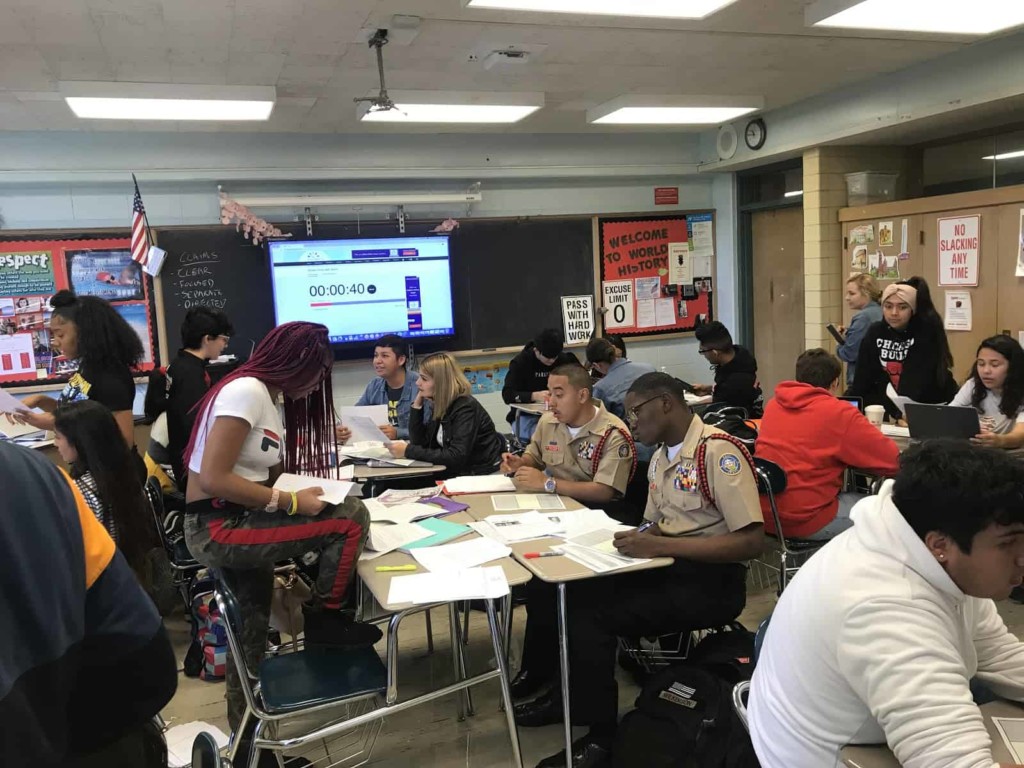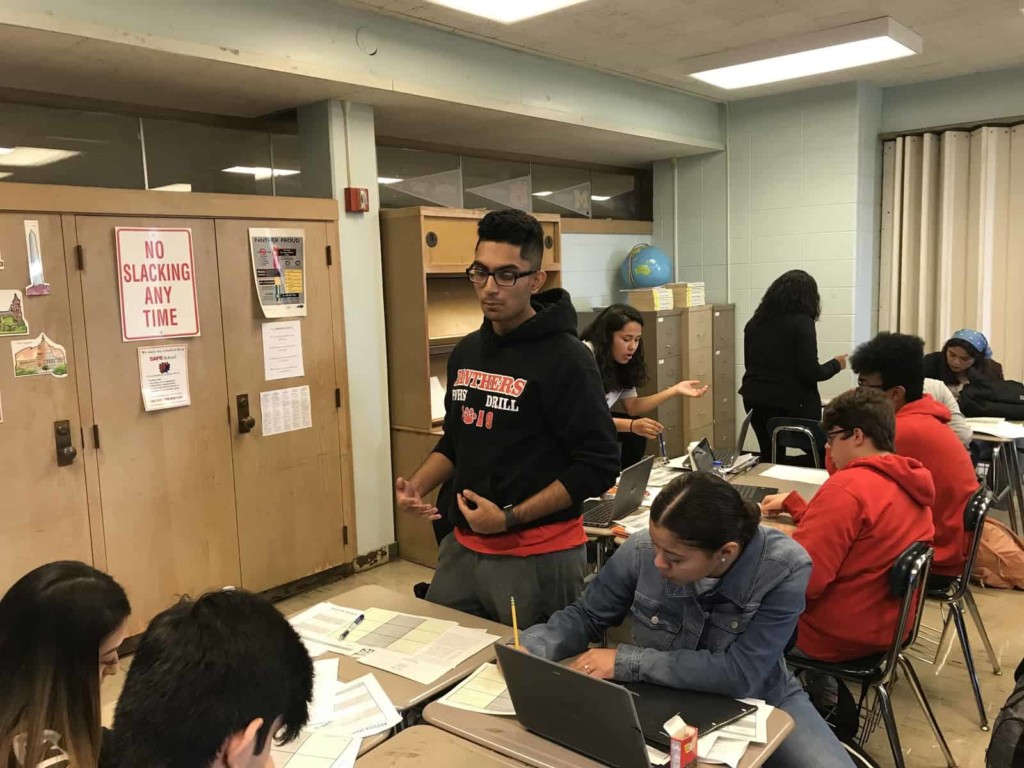Arguing for Agency: One Student-led Classroom Debate at a Time

By: Les Lynn and Eric Tucker
Understanding the ins and outs of the COVID-19 pandemic can be difficult—information changes almost daily, and public health guidelines shift, too. For schools grappling with these changes, it can be confusing. But it’s also a powerful learning opportunity for students: a chance to foster critical thinking skills and engage students in informed decision-making.
Brooklyn Laboratory Charter Schools (LAB) has partnered with renowned Chicago-based firm Argument Centered Education (ACE) to develop a suite of free, publicly available resources to encourage teachers, students, and families to have discussions and debate about different aspects of the pandemic and appropriate responses and protocols that can minimize risk and keep communities safe and healthy. Our goal is to help school communities work through available evidence and take ownership of public health informed, equitable choices along the way.
Our strategy is simple: Responding to the pandemic ultimately is about changing norms, behaviors, and priorities, and that means our community of students and families must shift how they operate. We are challenging our community to argue for its agency—to take ownership of good decisions based on factual information. According to ACE, “debatifying” the curriculum, as we are doing in this project, gives students an opportunity for deeper learning because it builds their agency by exercising their criticality. They are exploring different points of view, challenging each other’s assumptions, and debating the options regarding what constitutes the best solution.
 Guided by ACE, Brooklyn LAB has identified two different projects that revolve around COVID-related “debatable questions.”
Guided by ACE, Brooklyn LAB has identified two different projects that revolve around COVID-related “debatable questions.”
The first question deals with COVID-19 protocol enforcement and discipline: Should schools implement and enforce common coronavirus mitigation policies at the staff member or administrator level, or should students and teachers be called upon to act responsibly and self-enforce? The second question focuses on in-person school: Should schools restore full or hybrid in-person learning before a COVID-19 vaccine is available?
By doing research, developing positions, and then debating all sides of these questions, students not only learn about the scientific, public health, and public policy questions that swirl around COVID-19, they learn to apply critical literacy skills and to develop their own views. This kind of evidence-based argumentative discourse strengthens student voice.
The project also illustrates how there’s not always one right solution. The first question is a good example of that: students can make strong arguments on both sides. At its core, this challenge has to do with the best way to build a culture in a particular community, top down or bottom up? Our teachers and students have noted that the underlying question is similar to ideas that propelled restorative justice practices in schools: the possibility that administratively enforced suspension and code-of-behavior policies, while more direct and certainly more traditional, may not be as effective as student-enforced credos.
“Sure, mandates might get people into compliance, but schools also might be able to build a community culture around the response to COVID-19 if they are intentional about putting students in the actual forefront,” said LAB Academic Director Bennison Ntsakey. “Making arguments on all sides of this issue is a way for students to test and possibly apply progressive education theories in the context of the current pandemic that is so directly affecting their lives.”
We have seen how this issue queues up various practical questions of school governance that students are invited to think through. Should schools create student panels for enforcement of COVID-19 mitigation? What should punishments be if students or other constituents are caught violating protocols? Should violators receive a warning? How will the solution to this problem affect the way a school solves other complicated issues down the road?
The second project is a bit more straightforward, but it allows students to explore different points of view based on their research and their lived experience, which creates a nuanced debate. Students can pull information from the headlines, whether it’s a recent Nicholas Kristof column in The New York Times or perspective from the American Academy of Pediatrics about how in-person learning is best for the mental health of most American students.
For this question, students have a chance to make equity-based arguments, noting that when kids are in school for eight hours a day, every student in the school essentially is on a level playing field. On the one hand, having all kids in school serves this crucial and fundamental goal of public education. On the other hand, it may further spread the virus.
As students dig through and weigh the evidence to develop their arguments, they have a chance to consider the conditions under which either approach should be applied.
ACE supports students and teachers with a slate of resources for each question. For instance, Media Lists organize primary and secondary source material into three categories: background information, sources favoring one position, and sources favoring another position. LAB has supplemented ACE tools with materials compiled by teachers.
Because argument-centered instruction is so active and student-centered, it gives students more agency over their education, which can be more effective in promoting learning, particularly among students with higher needs. MAPS Corps Executive Director Dr. Nia Abdullah put the point this way, in a recent Education Post article:
As the former principal of a small urban, high-needs, extremely trauma-impacted high school, and later a comprehensive, majority Black and Brown suburban high school, I have witnessed firsthand the power of classroom-level debates on controversial current events to heal wounds, while simultaneously engaging African-American males in rigorous academic instruction that prepares them for college, career, and civic life.
Sure, it’s unlikely that members of our community will be called upon by the U.S. Centers for Disease Control and Prevention to offer their insights on pandemic response. But they are examining and sifting and weighing for themselves the critical information on COVID-19, and then making their own decisions. By facilitating an environment in which students and families use credible data to inform their own perspectives, we believe we can create a more informed community that is willing to do what it must to protect its members.
At LAB, we are applying an argument-centered approach to a crucial current issue in our students’ lives in order to educate and empower them. Together, we are arguing for agency, one debate at a time.
For more, see:
- Preparing for a Healthy and Safe Return to School: Public School Facilities Planning in the Era of COVID-19
- The Better Arguments Project
- Educating All Learners Alliance Launches Flagship Site, Shares Personas Educators Can Use to Understand Students’ Lived Experience During COVID-19
- The Debatifier, Argument-Centered Education
- Schools Need a Success Coach for Every Learner
- Resolved: Debate Can Revolutionize Education and Help Save Our Democracy, Robert Litan (Brookings Institution, 2020)
- Preparing to Reopen: Six Principles That Put Equity at the Core
- They Say, I Say: The Moves that Matter in Academic Writing, Cathy Birkenstein & Gerald Graff (W.W. Norton, 2019)
- To Reopen, America Needs Laboratory Schools
- How to Reopen Schools: A 10-Point Plan Putting Equity at the Center
- Reopening Schools: A Scheduling Map for Educators to Plan the Who, What, When, Where, and How of Learning this Fall
- The Front Porch: A New Approach to Support the Health, Safety, and Well-Being of Our School Communities
- Safeguarding Back to School: Preparation for a Healthy Return to School in Downtown Brooklyn
Les Lynn is the founder and director of Argument-Centered Education. Since 2013, Argument-Centered Education has been helping districts, networks, administrators, and teachers become effective in organizing and implementing instruction around engaging, balanced, and arguable questions at the center of the high school and middle school curriculum
Guest Author








0 Comments
Leave a Comment
Your email address will not be published. All fields are required.